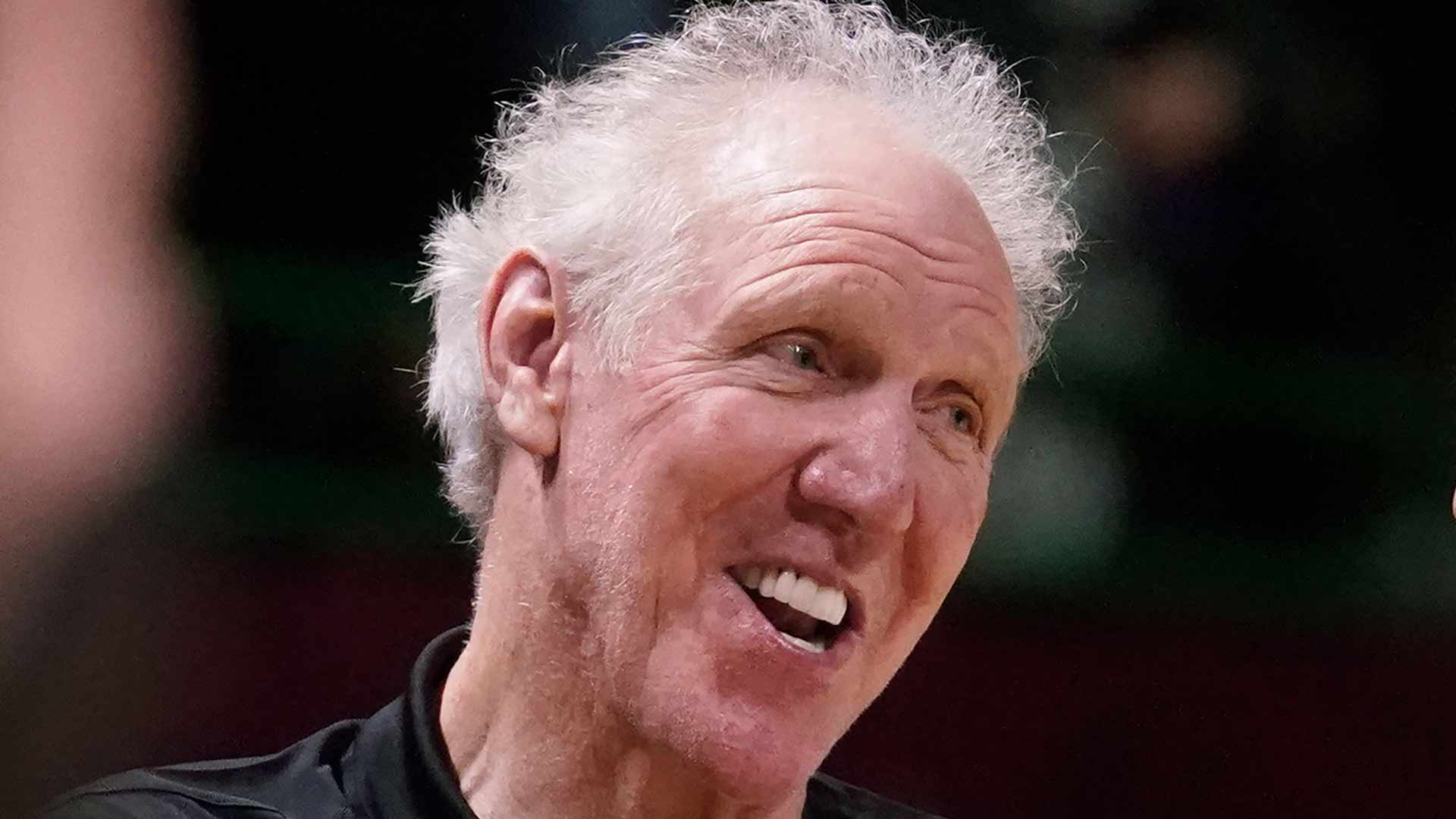 Basketball Hall of Fame legend Bill Walton laughs during a practice session for the NBA All-Star basketball game in Cleveland, Feb. 19, 2022. Walton, who starred for John Wooden's UCLA Bruins before becoming a Basketball Hall of Famer and one of the biggest stars of basketball broadcasting, died Monday, May 27, 2024, the league announced on behalf of his family. He was 71.
Basketball Hall of Fame legend Bill Walton laughs during a practice session for the NBA All-Star basketball game in Cleveland, Feb. 19, 2022. Walton, who starred for John Wooden's UCLA Bruins before becoming a Basketball Hall of Famer and one of the biggest stars of basketball broadcasting, died Monday, May 27, 2024, the league announced on behalf of his family. He was 71.
By Tim Reynolds, AP Basketball Writer
Bill Walton, who starred for John Wooden's UCLA Bruins before becoming a Hall of Famer for his NBA career and one of the biggest stars in basketball broadcasting, died Monday, the league announced on behalf of his family. Walton, who had a prolonged fight with cancer, was 71.
He was the NBA's MVP in the 1977-78 season, a two-time champion and a member of both the NBA's 50th anniversary and 75th anniversary teams. That followed a college career in which he was a two-time champion at UCLA and a three-time national player of the year.
“Bill Walton,” NBA Commissioner Adam Silver said, “was truly one of a kind.”
Walton, who was enshrined in the Hall of Fame in 1993, was larger than life, on the court and off. His NBA career — disrupted by chronic foot injuries — lasted only 468 games with Portland, the San Diego and eventually Los Angeles Clippers and Boston. He averaged 13.3 points and 10.5 rebounds in those games, neither of those numbers exactly record-setting.
Still, his impact on the game was massive.
His most famous game was the 1973 NCAA title game, UCLA against Memphis, in which he shot an incredible 21 for 22 from the field and led the Bruins to another national championship.
“One of my guards said, ’Let’s try something else,” Wooden told The Associated Press in 2008 for a 35th anniversary retrospective on that game.
Wooden’s response during that timeout: “Why? If it ain’t broke, don’t fix it.”
They kept giving the ball to Walton, and he kept delivering in a performance for the ages.
“It’s very hard to put into words what he has meant to UCLA’s program, as well as his tremendous impact on college basketball," UCLA coach Mick Cronin said Monday. "Beyond his remarkable accomplishments as a player, it’s his relentless energy, enthusiasm for the game and unwavering candor that have been the hallmarks of his larger than life personality.
“As a passionate UCLA alumnus and broadcaster, he loved being around our players, hearing their stories and sharing his wisdom and advice. For me as a coach, he was honest, kind and always had his heart in the right place. I will miss him very much. It’s hard to imagine a season in Pauley Pavilion without him.”
Walton retired from the NBA and turned to broadcasting, something he never thought he could be good at — and an avenue he sometimes wondered would be possible for him, because he had a pronounced stutter at times in his life.
Turns out, he was excellent at that, too: Walton was an Emmy winner.
“In life, being so self-conscious, red hair, big nose, freckles and goofy, nerdy-looking face and can’t talk at all. I was incredibly shy and never said a word,” Walton told The Oregonian newspaper in 2017. “Then, when I was 28 I learned how to speak. It’s become my greatest accomplishment of my life and everybody else’s biggest nightmare.”
The last part of that was just Walton hyperbole. He was beloved for his on-air tangents.
He sometimes appeared on-air in Grateful Dead T-shirts; Walton was a huge fan of the band and referenced it often, even sometimes recording satellite radio specials celebrating what it meant to be a “Deadhead.”
And the Pac-12 Conference, which has basically evaporated in many ways now because of college realignment, was another of his many loves. He always referred to it as the “Conference of Champions” and loved it all the way to the end.
“It doesn’t get any better than this,” he once said on a broadcast, tie-dyed T-shirt on, a Hawaiian lei around his neck.
“What I will remember most about him was his zest for life,” Silver said. “He was a regular presence at league events — always upbeat, smiling ear to ear and looking to share his wisdom and warmth. I treasured our close friendship, envied his boundless energy and admired the time he took with every person he encountered.”
Walton died surrounded by his loved ones, his family said. He is survived by wife Lori and sons Adam, Nate, Chris and Luke — a former NBA player and now a coach.

By submitting your comments, you hereby give AZPM the right to post your comments and potentially use them in any other form of media operated by this institution.